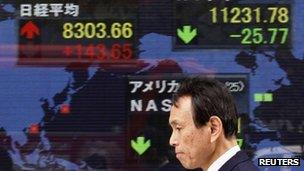Are markets betting on IMF bailout of Italy?
- Published
- comments

If it's a Monday in late November, it must be another messy day in the eurozone.
In Asia overnight, shares bounced on reports and rumours that reforms to limit the ability of eurozone members to indulge in spending and borrowing binges are being fast-tracked, and that a 600bn euros IMF bailout of Italy is close at hand.
The optimists' gloss on all that was that Italy's financial woes are being quarantined - and the rest of the eurozone is galloping towards the kind of fiscal integration that would (at the last) allow the European Central Bank to (in effect) underwrite the credit-worthiness of all member states (see my post, The eurozone's borrowing costs may stay lethally high, for more on this).
Oh, and Belgium - having seen its rating downgraded by S&P on Friday - finally approved a budget and looked as though it might after all these months form a proper government.
So there's your two steps forward.
The reverse movement is a new report by Moody's - which basically says that it misunderstood the inherent structural flaws in the eurozone, and there is a meaningful risk that it will have to downgrade the credit ratings of all eurozone members (even Germany) and possibly some EU members outside the eurozone.
We'll have Moody's answer by the end of March, it said. But in the meantime it's left us with this cheery thought:
"The probability of multiple defaults (in addition to Greece's private sector involvement programme) by euro area countries is no longer negligible. In Moody's view, the longer the liquidity crisis continues, the more rapidly the probability of defaults will continue to rise."
To be clear, Moody's is really only catching up with the kind of analysis of what's wrong with the eurozone that we've seen recently from the likes of Lord Turner, external, chairman of the Financial Services Authority.
But even though ratings agencies like Moody's tend to be more reactive than pro-active, they still have the capacity to spook those who manage big piles of dosh in Boston, Abu Dhabi and Singapore - and who therefore will be tempted to give the whole euro area a wider berth, in the process of placing their wonga.
Oh, and as for the putative IMF bailout of Italy, well an IMF spokesman says no talks have taken place. And Bloomberg this morning adds this:
"Japan's government isn't sure whether Italy wants a 600 billion-euro IMF rescue, a Japanese government official said on condition of anonymity because of his ministry's policy. The G7 hasn't discussed the issue, the official said."
So is the euro glass half full or half empty?
Well shares in London have risen pretty strongly at the opening - so they apparently regard what Moody's is saying as old hat.
And, if I'm honest (which I strive to be) I am not really sure what the price of Italian government debt is saying this morning.
Right at the opening, there was a spike in the implicit interest cost to Italy of borrowing for two years (the yield on two-year bonds) to a euro-era record of around 8% - and then it fell back to 7.5% or so, which is where it was on Friday (which is still high).
The price for Italian government of borrowing remains prohibitively high. Which implies that even if the Italian government isn't talking to the IMF about financial support, it may only be a matter of time.
PS Eurozone banks are a bit more stressed than they were: they have placed 256bn euros on deposit at the European Central bank at its penally low interest rate, up from 237bn euros, rather than take the risk of lending the cash to other European banks.